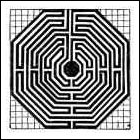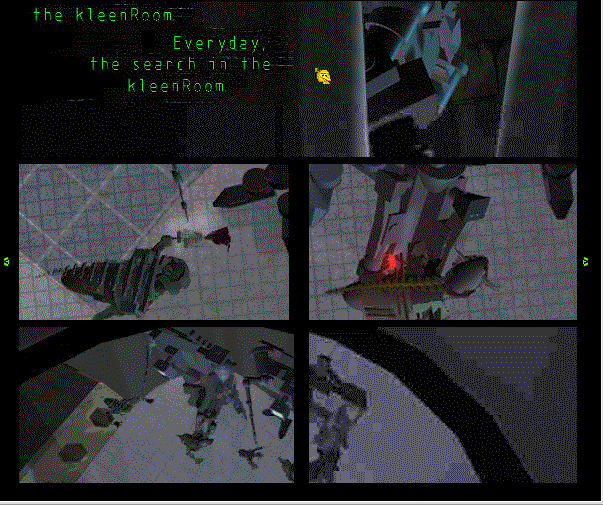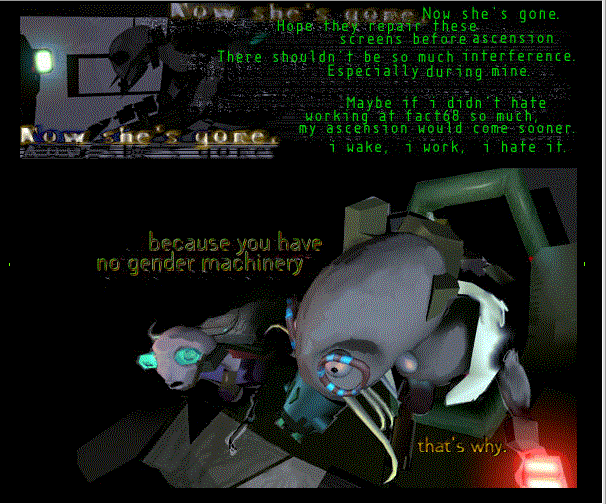
Tripod Members Page last updated:
22 November, 2000

|
Poetry for My Classes

More Poems Like These:The Second Poetry Page
Pointers on the Way :Return to the LabPoetry Links


The Poetry URL of the Moment

|

W hat is it?
The Questions Poems Ask
Watching a couple of crows
playing around in the woods, swooping
in low after each other, I wonder
if they ever slam into the trees.
There's an answer here, unlike
most questions in poems,
which are left up in the air.
Was it a vision or a waking dream?
You decide, says the poet.
You do some of this work,
but think carefully.
Some people want to believe
poetry is anything
they happen to feel. That way
they're never wrong. Others yearn
for the difficult:
insoluble problems, secret codes
not meant to be broken.
Nobody, they've discovered,
ever means what he says.
But rarely does a crow
hit a tree, though other, clumsier birds
bang into them all the time, and we say
these birds have not adapted well
to the forest environment.
Frequently stunned, they become
easy prey for the wily fox,
who's learned how to listen
for that snapping of branches
and collapsing of wings,
who knows where to go
and what to do when he gets there.
Lawrence Raab
The Probable World
Cruiser
We would quicken in the vinyl
(velour if we were lucky) of our third mothers,
with their huge eight-chambered hearts & cleavage
deep to the very block, with their buxom dashboards
perfumed with specious pine, their dials & meters,
dual bands,
& songs for names Ñ Delta, Regal, Skylark,
not Vera or Constance or Jane Ñ with their ample
headroom
& sturdy bodies forged from ribs, bituminous & ferric,
torn from our state's west side. Think dead
of July of pumping gas by day, Crusoe of the concrete
isles,
tending my private garden of stains
that bloomed in rainbow colors after sun- or
thundershowers,
dreaming all the asphalt hours of Friday
night with Janet Moscowitz or Ellyn Chanin, Cindy
Patterson
or Lisa Koss (I have to strap myself to the pencil's
mast
even now to print those names), with Carol Elliot & her
flawless mouth
no longer full of correction & lisps. Think serving time
in Exxon
exile, customers who sparsely tipped, knowing
yourself
the lord & master, nonetheless, of cowering dipsticks,
bold suppressor of steamy uprisings, cleanser of the
sins of
robin redbreasts,
crows, the Great Emancipator of genie-like fumes. &
think of
waiting, of cooling your molten heels
beneath a sky in tiger-orange shreds promoting
change
of brakes & oil, twirling thumbs like universal joints &
tying hands
in complex knots for which no merit badge was sewn.
Then
think of
sweating it out a little longer Ñ the final hour a frozen
gearbox, a
rusted lug nut refusing to turn Ñ
the air hose hissing, like the Fiend Himself,
incessantly
in your simple ear, urging you to cut out early, to take
that first
transgressive bite of freedom, a pox on its hidden
worm. But
imagine hanging in there
an impossible moment more....
counting the drawer-closing minutes out,
like the pennies, nickels, & dimes they were, for
Karen Franchi come stars, come cricket dark, full
moon
of her shining arm's inoculation mark, for the two of us
at last
to turn down some unpaved road & park
in her parents' Olds, with its padded elbow-rests &
seats
bouncing us on their cushioned knees, its power
locks & steering, arctic a/c, its glowing,
120-mile-per-hour
promise
of 100-percent-pure American speed. She would shut
the engine
but not the FM off, scroll the windows down, setting
the polar
spirits
free. They would scatter in a field of garter-rocks &
weed,
& before knowing it we'd be intertwined like twins,
alloys,
weft & warp, content & form, forming an ampersand of
twisted
clay
in every conceivable conjunction, fusing new
contractions by
closing the gap
between the sacred words of our once-divided flesh.
We would
cross & double-cross our ankles, arms, & lead us
deeper
and deeper into temptation, without ever reaching its
other,
darker side Ñ
fulfillment. We would suck our bloods without
breaking
the skin, leave pink carnations, roses, violets
on each other's throats, flowers on our childhoods'
graves.
I'd be groping sightless, trying to learn how to read
a bra clip's Braille, while Karen Franchi apprenticed
in the midwife's craft, nervous to deliver the
undersized
quintuplets
of my short-sleeve's buttons, her fingers quaking
throughout those
difficult
reverse births. Time would spin all three wheels
in a vital stasis, a here & now that gleamed like
polished chrome.
A glorious present would come alive, inhaling the
future, exhaling
the past,
while keeping them invisible to us as summer breath.
We would
only know
the unescorted this of katydids, cantoring from
balconies of trees,
of Wild Cherry's "Play That Funky Music," Rod
Stewart's
"Tonight's the Night,"
crossing whole oceans of air on rolling waves
to bow before the shrine we'd build
on the shining hill of every knuckle, at the confluence
of our
many-rivered palms,
bow, I said, before our temple of hair & bone, joint &
nail,
fingerprints locking groove to groove. Which were
you Ñ her or
me?
both or neither? Ñ as little brothers & sisters dozed
in adolescence, while fathers & mothers slept in the
same
monarchical bed,
yet still in separate rooms? Whom were you holding,
or withholding yourself from, while we would turn
together, back
& forth, side
to side, like a radio knob, trying to tune in through the
static
to the single music we'd christen "our song"? Elders,
literalists all,
called it "necking"; to us, it was "making out" Ñ
a phrase that better captured the unlikely
success of the thing, our great dumb luck
in that scorching month we started kicking
our legs nearly out of their sockets, trying to kick
them out of
jeans
that clung like skins, placentas, as we clung to one
another
like stitching & seam, space & ink, consequence &
cause.
We were not haunted, you understand, by former lives,
& had no
adult sense
of ourselves as the houses (small closets even)
of ghosts. We were unaware of being rent in two
by tomorrow & yesterday Ñ those siblings constantly
warring
over the fragile doll that is one life. It was 1976,
we were seventeen, our days were not a series yet
of might-as-wells & might-have-beens. We were not
anxious
over quandaries, wouldn't pick at them like splinters
or scabs. &
we didn't care,
didn't think to care, whether we would find our
proper
distance Ñ
a berth wide enough, but not too wide, to keep us
intimate,
longing
for each other's next embrace. Because there was
nothing
creeping up in our blind spots; no bottlenecks or
wreckage lay in
wait
ahead, & there could be nothing
false between us, nothing more than harmless alarms:
a stray dog scratching at the driver's side for scraps,
dead
branches
crashing down through living, our four ears perking up
at first like
rabbits',
then easing safely back into their warrens. Where, I
wonder,
were you Ñ in what mezzanine seated? Ñ when we'd
resume
our dance
within the atomic dance, our play within the cosmic
play, me
the log-lugging grunt to her Prospero, patrician
magician now
to her kindling hunter? What were you doing or
thinking while
we'd pull off our
daring spectacles, fearlessly walking the high wire
between vexing contraries, swallowing the fires
sparked by our
two rough flints,
rubbings of our spindly limbs? Were you even paying
attention
enough
to warn us before the double-barrel of that cruiser's
headlamps
swung over
our quick-ducked heads? Perhaps you could have
cried out
"Fuzz!"
or "Bacon!" Ñ or simply whispered "Police"? But maybe
you had yet to feel the strain of trying to stay
quiet, of keeping your lips buttoned after
everything's been
loosed.
Perhaps you didn't know, that far back, what it was
like
for time, a stubborn zipper, to refuse to budge again,
no matter how hard you yanked it with a wish
that furtive, gravel-crunching cruiser would pass on
by
without paying you one pebble of mind. But surely you
know by
now
that much of this never happened,
at least the way I say. You know whatever it is
we call love, or closeness, or just plain desire,
appears
most luminescent, most clear, when the actual facts Ñ
those
nagging skeeters,
swirling gnats Ñ are swept away with a swish of the
hand. &
you are perfectly aware
that before that great black-and-white can swim off
into gray,
before I can tell how Karen Franchi & I
(or was it Carol Elliot, after all?) climbed out
onto the hood of her parents' pale-green Olds,
or LTD, or Grand Marquis, once the law did
disappear, before I can describe the way we splayed
ourselves
across that massive expanse of steel, with its rifle
sight of an
ornament
aimed at the enemy distance, or how we rested our
naked backs
against a private beach of melted then supercooled
sand,
I'll have to come clean & admit there never was a
cruiser,
& that I was certainly no cruiser myself. I will have to
state for the
record
that I was one who traveled strictly in a circle
of one, & spent my weekend nights with my family of
four
speakers & Pioneer components, a harem of albums
sprawled
around me
on the floor Ñ only my cravings & boredom moving
back &
forth, side
to side, like LEDs. I'll have to fess up
that all along the ampersands were me, seated
cross-legged, in
bashful
profile, unable to face beauty head-on, to hear its
harsh appraisal,
its gavel
thwack, or listen to my heart shake loose & drop,
with a rattle & thunk, like a can in the station's Coke
machine.
If that's "confessional," then you're a priest Ñ
forgive. Forgive because you can, because we're all
alone in this
together, every crime is ours, & not to forgive is the
worst
we can commit. Perhaps that's overrighteous, so
forgive, & I'll repay, as best I can, with all five
kingdoms
of the world: animal, vegetable, mineral, the kingdom
of heaven,
& the soundless void. I'll take you back to a golden
age
before our words were dead, when "right on" &
"radical"
leaped off our tongues with trapeze ease, when
"fuck"s
were capable Ñ imagine! Ñ of "flying." I'll return us
to a time when you yourself had no idea
that so much remains
split off from us, anonymous, that most things are
known
by their aliases only, & that we might be nothing
more than our gropings toward & of each other in
respective
darks. Once,
you had no honest clue
that all the good intentions & acts of kindness in
creation
don't stand a chance of halting the march of
degradation &
despair,
& vice versa. You couldn't fathom then
what letting memory lead you to its waters meant:
that it would
make you
drink, would force your face down into & past your
face, that it
would hold
your head beneath the surface until your lungs burst
into gasps of song. Think back: the nation had turned
two
hundred;
the fifty-first state shone white & full within what
seemed like
our easy grasp. I told Karen Franchi if she looked
closely
she could see the flag, waving in the solar wind. She
said I lied,
& laughed. Knowing everything Ñ that nothing Ñ
I walked her through the zodiacal zoo, explained black
holes,
their infinite, light-swallowing throats, told her there
was no God,
no You, that human prayers were like those giant
flares
flung out from then looping back to the sun. (I'd been
reading
Asimov
& Sartre.) She laughed again, & suddenly so did I, for
no reason
I could voice. Sometimes I still hear that laughter of
mine,
& it seems the only one I still possess
not shot through with the cynical or cracked. Will you
guffaw at
my expense
if I tell you I still carry Karen Franchi's arm Ñ
whether it was ever there or not Ñ around my
shoulder,
& that some nights when I lie in bed, after snapping on
the dark, after distance (but not longing, never
longing) closes
down, I think of her
& of her parents' car, whatever make it was,
with its haloed tires, quadruple-barrel carburetor,
windshield
scarfed with tint,
with its glove box the size of the cradle, trunk as
deep as the
grave,
& I forget to worry if there is truly any greater good
than a single voice, anything more to life
than life itself. I simply believe in our communion, our
laying on of
hands
that would have made the purest of evangelists wince
with envy & delight. I believe
in the complete & unambiguous way I once believed in
the
accostive stink
of leaded fuel, in the tainting powers of grease,
the purifying of Go-Jo soap. & truthfully, I feel less
afraid.
I am comforted, in fact, by how full we once were
of each other, how empty of ourselves,
& how we pressed our lips together, as if each kiss
were our first in, & our last for, many, many years.
Gregory Fraser
My Father Singing in the
Basilica of San Marco
I'll never be as handsome as my father,
singing Vivaldi, when he's seventy-five,
beneath gold domes or strolling by the water.
The choir will go to Harry's Bar together
after the concert. The young tenors grieve:
they'll never be as handsome as my father.
There's one they call my "double." I bet he'd
rather
have my dad's full head of hair and never leave
gold domes, humped bridges, and the rising
water.
"Why don't you join us? We could use another
voice for the Gloria." But I believe
I'd never hit the high notes like my father.
Gold domes glow like furnaces, the weather
heating up outside when singers move
through the Piazza, thirsty for Scotch and
water.
Where's the blown-glass mirror to show each
other
what we both fear, what we sing to disprove?
I'll never be as handsome as my father
until our funeral launches cross the water.
John Drury

Incident at Third and Woodlawn



More Poetry? Click Here!Outside contact has been made
Member of the ComeVisit Network |

|
|
http://www.lemkesoft.de
|